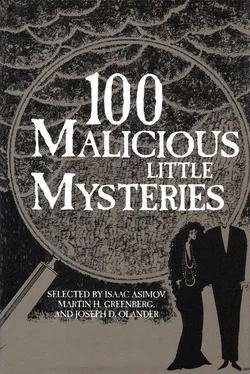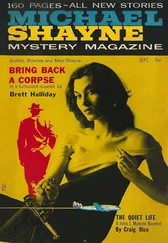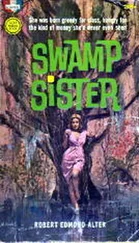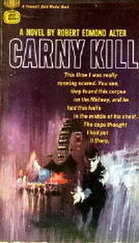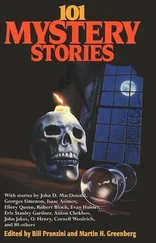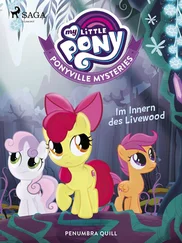Weatherlee nodded acceptance. “To be quite honest, I was a bit surprised that the club decided to accept you. Not without exception, of course. Captain O’Reilly was quite against it.”
Sloan moved to the bureau and picked up the magnum of champagne.
Weatherlee blinked. “What are you doing?”
“Taking the bottle with me. You told me yourself that according to the club’s by-laws, the youngest member is Custodian of the Bottle.”
“Yes, but...”
Sloan opened the door to the corridor. He smiled broadly. “We wouldn’t want you to go around asking strange people to break it, now would we?”
When Sloan was gone, Weatherlee locked the door.
He went to the bathroom and began removing the make-up from his face. As he worked, a half century disappeared.
Maybe he could have taken Sloan for more than five thousand, but you never know. Getting too greedy could have blown the whole deal.
He smiled.
Finding the sucker was the hardest part of it.
But once you did, and learned approximately how much he could part with without undue pain, you went about arranging the set-up. That included going to the nearest Old Soldiers’ Home and offering to treat a dozen of their oldest veterans to a dinner.
And the old boys did so enjoy an afternoon out.
Two Postludes
by Isak Romun
Desmond Blinn carved a dripping slice of the rare beef, pushed it down on a piece of rye, put another piece of bread on top of the meat, and took great bites, his free hand feeling his stubbled face. A beer was nearby, warm now, poured out too long ago, just before he began wrestling with his thoughts. But he drank it lustily, driblets of pale amber upon his new beard turning into small reflective beads perched on the tips of stiff hairs.
It was a good meal, a good last meal, hearty and rough as his life had been; and simple, simple and direct, as he knew his death was soon to be. A strange man, Bohlmann, the leader; a man for little rituals, careful observances, precise ceremony. The traditional “last meal” of the doomed man’s choice, a case in point. What would take place soon? — a quick walk into the courtyard, Blinn’s hands tied behind him, two strong boys, each with a paw upon a shoulder, pushing him gently but with no nonsense to his knees; a long wooden slat upon which thick, brushed letters proclaiming the crimes of ingratitude, treachery, and betrayal of which Blinn had been accused and, in Bohlmann’s direct, thick-robed judgment, found guilty. And then, one gunshot up through the neck into the brain and eternity would fold out in front of Blinn.
Bohlmann had seen the method in a newsreel: Chinese Reds, the strips of wood calligraphed with records of infamy, executed by Nationalists — or the other way around; and the simplicity, not devoid of a certain economical pomp and high moral tone, was appealing, irresistible to his nature.
“Let us try that with the very next one we shoot,” he had said jollily, and Desmond Blinn remembered, with a tremor, for it was he who had accommodated Bohlmann, who bent down, aimed the gun upwards, and pulled the trigger, then stepped back quickly as the two burly boys, like pas de deuxing dancers, sprang off to the sides to escape, with Desmond, the squirting blood and the small flying pieces of brain.
And now, he, Desmond Blinn, would again be a participant in this final ceremony. For what? A woman. So foolish, for there were so many women. Bohlmann secured them and spent them like copper coins, and soon Blinn would suffer because he rubbed one while there was some sheen still upon it. The woman had been disposed of, thrown down a well and left to die there. Women did not get to participate in the Ceremony, only men — the ones against whom Bohlmann mounted huge accusations, driving himself up a spiraling curve of vengeful rage until, convinced of the utmost perfidy, he pronounced the awful sentence: the Ceremony.
“Tomorrow,” he had shouted at Blinn, his wet red mouth quivering with anger and expectation. “Tomorrow, at dawn.” It was always dawn, another nicety, another line in the format: a chiaroscuro effect cherished by Bohlmann.
But in the meanwhile, thought Desmond Blinn, there’s this splendid beef, cut from a cow stolen, slaughtered, and cooked over a great fire that day, and the rough, simple bread, and the beer, though warm, satisfying but almost gone. Might they give him another?
As Blinn went to the door of the cell in the monastery the band had taken over, he felt a keen exhilaration over how well he was taking this whole thing, enjoying the meat and bread, even rattling his agateware cup, chips of its coating flying about, against the short bars of the small opening in the door and shouting down the corridor, demanding more drink. And, by God, see that it’s good and cold!
He was certain he could hold out this way, relish what life he had left without indulging in false hopes that somehow it would go on beyond the approaching light, that at the last moment he would receive a reprieve and be welcomed back into the band. No, that would not happen, but Blinn would rob Bohlmann of some of the glee gained through the Ceremony. Hah! — for what was the Ceremony designed? Not to make a man stand tall and stare back upon his persecutor at that last moment, as against a wall to be shot or, rope around his neck, upon a nervous horse. No, the victim was pushed down, his head bent forward, the wooden slat a comical element in a piece already without dignity; and then in this ignominious position, almost fetal (strange, that), the muzzle of the gun was pushed up against the short nape hairs but not fired until Bohlmann, off to the side, fat and squalid in his canvas chair, his torpid face moving rhythmically to the steady chewing of browned sesame seeds, masking his inner elation, gave the signal. (Caligula at the Circus Maximus.) By this time, the miscreant was reduced to a quaking, screaming figure, explaining to Bohlmann, pleading with Bohlmann, assuring Bohlmann that whatever in the world he had done (and perhaps he honestly didn’t know), it would never occur again. Never.
If only you’ll let me live. That’s what they all said, thought Desmond Blinn as his cup ceased its insistent, cadenced ring upon the bars, and his knees felt a certain wateriness when he thought of those wretches, each now in his thoughts, remarkably, with his own face, the fear-stricken face of Desmond Blinn.
He wiped this vision of an uncongenial immediate future from the slate of his mind and struck up again the racket of cup against bars, calling out loudly (too loudly?) for more beer. Then he resurrected the images so recently discarded and ran them through a mental projector so that each, miraculously transformed now, showed Desmond Blinn as staunch, unbreakable, tight-lipped, and not without a trace of annoying wryness playing about his features, robbing Bohlmann of his pleasure.
For now, as one of his guards came padding down the corridor, Blinn knew, knew, that he would go through the Ceremony as these last pictures showed him, that he would deny Bohlmann the circus scene he coveted.
But the approaching guard ignored Blinn’s demand for more beer and pushed a face against the bars of the small opening and blew his sweetish breath into the cell as he whispered quick and precise instructions to the confined man. The guard was Pardrilone, an old-time member of the band.
Tomorrow it would be over, he told the prisoner, but not for Blinn. For Bohlmann. If the men didn’t turn from him now, he said, each would, in time, march screaming to the same fate that their leader planned for Blinn. Bohlmann was mad!
It was, after all, Pardrilone explained, not for a woman that Blinn was to die, but because he represented a threat to the leadership of Bohlmann, just as Bohlmann had been a threat to his predecessor. The woman had been emplaced to provide Bohlmann with an immediate cause for ordering Blinn’s extinction; and perhaps the woman’s as well, for Bohlmann was tiring of her.
Читать дальше
